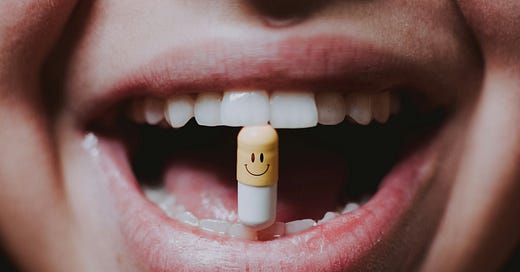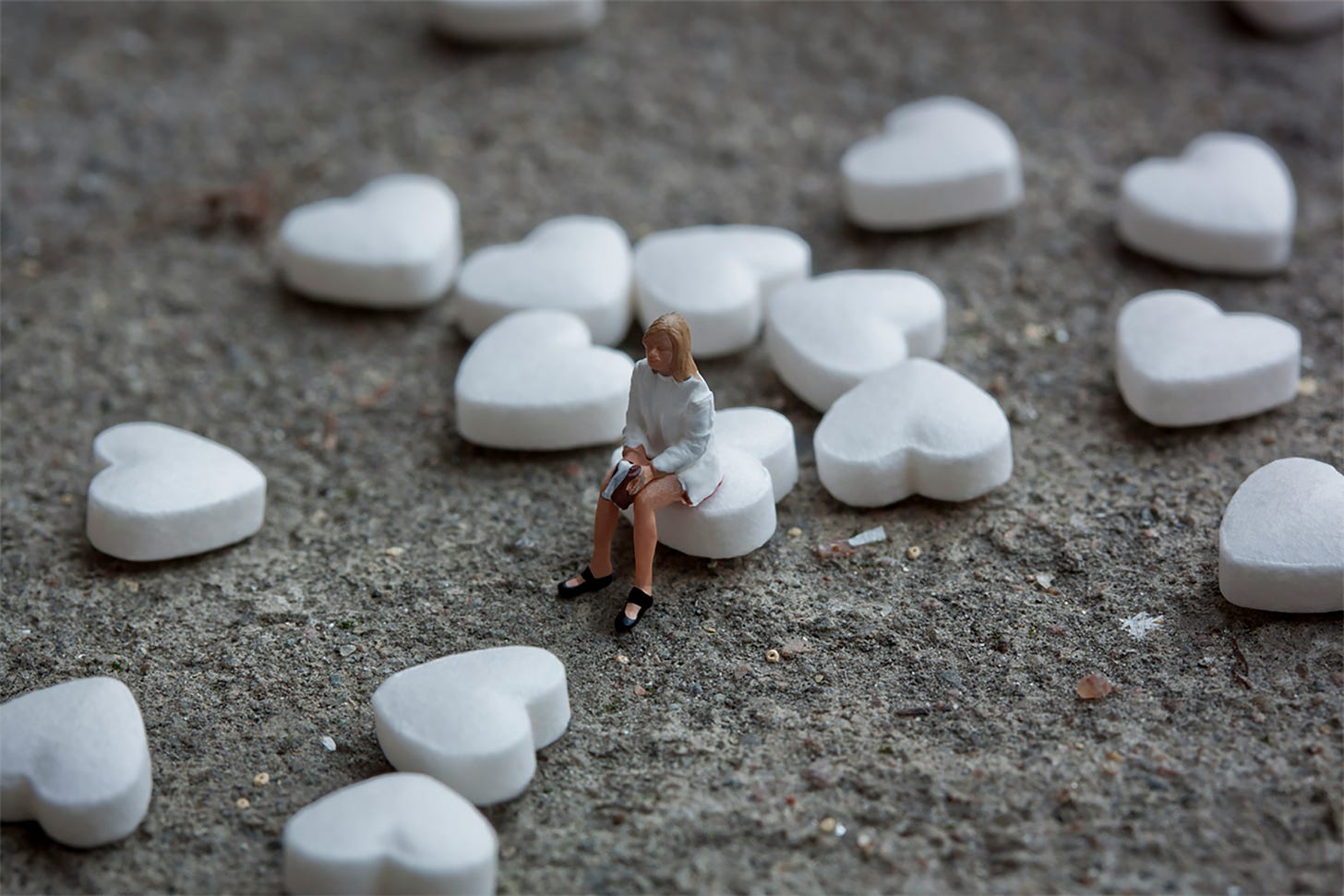Antidepressant comeback!
I'm healing, and my will to create is coming back, but let's not jinx it.
Since 2016, I have had a “miserable phase” at least once a year.
Trigger warning: Mental illness.
It’s been almost eight years since I was first diagnosed with Major Depressive Disorder, and I’ve been on and off meds and therapy heaps of times; I forgot to count. I know I haven’t been the best patient because I’m im-patient… (first dad joke of the newsletter!)
More than once, I randomly stopped medications because I convinced myself they weren’t working. Well, according to my new psychiatrist, it wasn’t that they weren’t working (because I would get better when I first started), probably the dose of the medication wasn’t sufficient enough to treat me. Instead of consulting someone, I would quit. But a few months ago, I experienced another one of those familiar “miserable phases.”
Despite achieving my lifelong goal of moving abroad, having the most loving husband, and a profession I thought I would love, I was waking up every day thinking, “I hate this life.” I was joyless for no reason. I wasn’t even sure if this life was worth living. I wasn’t suicidal, but I didn’t know what would happen if I kept going like that. It felt like I was missing from my own existence.
In my quest to reconnect with my soul, I began the search for a psychiatrist once more. This time, I was determined to heal completely.
Let’s normalize these conversations
Even as I write this title, I realize how scared I am to open up. Mental health is still such a taboo; it's unbelievable. There's no evidence I can show people, just attempts to describe the emptiness inside me that I didn’t have the energy to explain. There's no scan to present that could convince others. And it's not just others; even I was judgmental towards myself. I've questioned my diagnosis countless times. Even after consulting a psychiatrist, undergoing tests, getting prescribed medication, starting the treatment, and noticing some improvements, I remained doubtful.
"Am I just making this up?"
Getting a diagnosis
I know ADHD has become a “popular” disease in the last few years, leading many to discover its existence and think, “All these symptoms sound very familiar! Maybe I have it too?”
I started questioning it a few years back, after I first came across it somewhere (probably on TikTok) and learned that it’s a thing. I had to fight hard for a psychiatrist to take me seriously. One of them didn’t believe adult ADHD exists. She told me if I had it, I would’ve been diagnosed when I was a kid. Well, that might not be the case for the inattentive type. Why would any parent consider taking a lazy, forgetful, and disorganized kid to a psychiatrist? These symptoms can look like personality traits until you start to struggle with adulting.

After that experience, I decided to take a break from seeking a diagnosis. A year or so passed, and my questioning resurfaced, leading me to consult another psychiatrist.
He wasn’t very convinced at first but agreed that I could take a test. I took a test called MOXO which I found it a bit weird, but it revealed some impulsivity issues. Could I have been right all along?!
Just as we were about to start treatment, my psychiatrist moved to another city, and I had to be transferred to another doctor, who dismissed my test results to focus solely on depression. Feeling defeated, I stopped looking for answers.
Two years have passed, and, as you might guess, the questioning began anew, this time with more clarity. “What if my undiagnosed and untreated ADHD is triggering my depression? Could that be why it keeps coming back?”
“ADHD can lead to depression when people have a hard time with their symptoms. ...adults may have issues at work. That can lead to deep feelings of hopelessness and other signs of depression.” (source)
So, after all, my urge to find an answer was stronger than ever, one last time. I was so focused on obtaining a diagnosis that I hadn't fully considered the next step if I received one—whether I'd need to take medication for it or simply gain awareness and adapt my lifestyle accordingly.
After a long phase of indecisiveness, I finally found a psychiatrist who specialized in adult ADHD. It seemed almost too good to be true, yet she restored my faith in the existence of knowledgable and up-to-speed professionals. After undergoing some tests, we began treating both my depression and inattentive type ADHD.
At first, I felt hesitant to start over, recalling the side effects that would haunt me in the first few days: nausea, headaches, and feeling sick. Yet, I didn’t have a Plan B. I had to stop doubting and trust in science to help me.
Stop discouraging people from taking medication
I know it’s not wise to compare diseases, but bear with me. Imagine a cancer patient for whom chemotherapy might be the only path to recovery. Would you casually share your opinions on the side effects of chemotherapy or what you would do in their place? Probably not, because it’s recognized as a complicated disease that you would take seriously.
Now, envision the same patient feeling ashamed for having cancer, as if it were their fault, or as though it’s a topic too taboo for public discussion. If they decide to open up, they're risking judgment while seeking support.
When it comes to mental illnesses, many people fail to offer the same level of seriousness, thinking it’s just “in their head” and suggesting that “they will get better if they just leave the bed and go outside more.” It takes massive strength to do so and some don’t have it.
What I’m trying to say is, if you don’t have another magical solution, don’t talk shit about any medication. For those battling mental illnesses, medication might be their only choice to get better.
“You don’t need medication, don’t poison yourself!” what a bullshit advice that is! Stop telling people what to do about things you have never experienced, read, or researched. Even if you know what you are talking about, before feeding them with your thoughts, listen to them and ask what they want for themselves.
“Running therapy may be as beneficial for depression as antidepressants." (source)
When I was feeling depressed, a close friend shared the above article with me. I had read it, but even though I knew the possibility of getting better, I had to power to make myself do it. Still, it’s good to know for those who could.
It’s not your fault
All my life, I've been so successful at blaming myself for things I'm not built to do, no matter how hard I try.
"I can't manage my time well! Let me watch this productivity video made by a neurotypical person. But if it doesn't work, it's definitely my fault, not because it's not made for someone neurodivergent.”
A few weeks ago, I decided to start therapy again and had my first session. In the middle of the session she said;
"You sound like you don’t take your depression seriously. Is it something so insignificant that you think you can just ignore it? What if you're expecting too much from yourself? What if there are some things you can't do and aren't in your control?”
I replied, "If I can get out of bed, I assume it's not that bad. I tend to ignore it and expect myself to function properly."
I talked a bit about my ADHD diagnosis in a disbelieving manner, "I don’t know, maybe I’m just lazy after all!" Despite being on treatment, I still tended to blame myself.
Then, I tried to consider my therapist's point of view, "But if it’s real, if some things are not in my control, and if I’m like this because of ADHD…" I couldn’t finish my sentence because I started crying. Just considering that it might not be my fault released all the pressure I had put on myself.
When my current psychiatrist asked for my family's medical history, I realized that both of my parents and at least one family member on each side have struggled with mental illness. There are many potential causes of depression, including psychological and physical factors, but genetics is one of them.
“If someone has a parent or sibling with major depression (might be undiagnosed as well), that person probably has a 2 or 3 times greater risk of developing depression compared with the average person (or around 20-30% instead of 10%).”
“Recurrent depression is less common – the exact percentage of the population is not known, but is probably around 3-5%. But the siblings and children of people with this form of depression probably develop it at a rate that is 4 or 5 times greater than the average person.” (source)
This doesn’t mean it has to be, but might be one of the reasons. Remembering this helps me to be kinder to myself. It could have been inevitable due to my biology or other factors, but the point is, it’s not my fault.
You didn’t cause it. You didn’t ask for it. It’s not your fault.
Forgive yourself and never forget that it’s just a fucking disease.
Huge sigh of relief.
Thank you for reading.
Aycan









It takes immense courage to write this. And more that that, courage to seek help when we need it. The moment we stop shaming people for their mental health,the easier it'll become for them to speak about it and seek help. I've been suicidal in my teens and if it wasn't for a bunch of friends who stood by me, I don't think I'd be here today.
hugs and love you. thank you for sharing this. 🫂💗